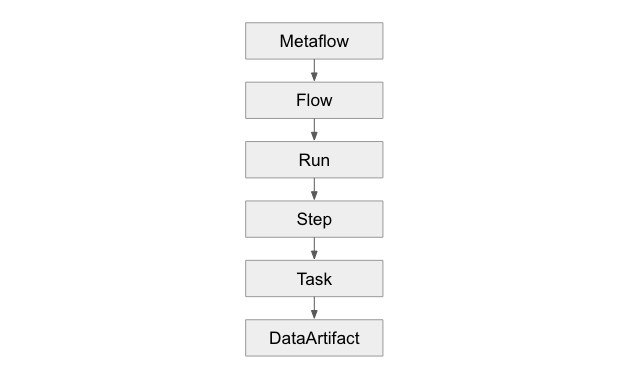Inspecting Flows and Results
Metaflow provides a client API that is used to inspect results of past runs. It is particularly well suited to being used in notebooks.
This document provides an overview of the client API.
Object hierarchy
Note that all operations in the Client API are filtered by the current namespace, as explained in Organizing Results. If you do not get the results you expect, make sure you are in the correct namespace. The Client API consults the metadata service to gather results, so make sure that the client is properly configured to use the correct metadata provider.

These objects can be instantiated simply with
# Flow object
flow <- flow_client$new("HelloWorldFlow")
# Run object
run <- run_client$new(flow, run_id)
# run_id is 12
run <- run_client$new("HelloWorldFlow/12")
# Step object
step <- step_client$new(run, step_name)
# step_name is start
step <- step_client$new("HelloWorldFlow/12/start")
# Task object
task <- task_client$new(step, task_id)
# task_id is 12345678
task <- task_client$new("HelloWorldFlow/12/start/12345678")
# Data Artifact
task$artifact("my_var")
Navigating the object hierarchy
Every object listed above follows a consistent interface. All the operations below are available in all objects, not just the ones demonstrated.
Listing children
# list all past runs
metaflow::list_flows()
# list all past runs of the flow object
# shows a list of strings of run_id
print(flow$runs)
# list all step names of the run object
# shows a list of strings of step names
print(run$steps)
# list all task id of the step object
# shows a list of strings of task_id
print(step$tasks)
Accessing a specific child
You can access a specific child simply by
helloflow <- flow_client$new("HelloFlow")
run <- helloflow$run("2")
Accessing data
One of the most typical use cases of the client API is to access data artifacts produced
by runs. Each data artifact is represented by a DataArtifact object whose parent is a
Task.
DataArtifact is a container object for the actual value. Besides the value,
DataArtifact includes metadata about the artifact, such as its time of creation.
Often you are only interested in the value of an artifact. For this typical use case we
provide a convenience property $data in the Task object. The $data property
returns a container which has all artifacts produced by the task as attributes.
For instance, this the shortest way to access a value produced by a step in a run:
task <- task_client$new("DebugFlow/2/compute/123")
print(task$artifact("my_var"))
Here, we print the value of self$my_varx in the step compute of the run 2, task
123 of the flow DebugFlow.
Properties of Flow/Run/Step/Task Objects
You can check the full object documentation by:
help(metaflow::flow_client)
help(metaflow::run_client)
help(metaflow::step_client)
help(metaflow::task_client)
Every object has the following common properties available:
tags: tags assigned to the objectcreated_at: creation timestampfinished_at: finish timestampparent: parent objectpathspec: object fully qualified name
You can find more details in the object documentation.
Metadata provider
The Client API relies on a metadata service to gather results appropriately. Metaflow
supports a local mode (.metaflow directory on your filesystem) and a remote
mode.
# Fetch currently configured metadata provider
metaflow::get_metadata()
# Configure Client to use local metadata provider globally
metaflow::set_metadata('/Users/bob/metaflow')
# Configure Client to use remote metadata provider globally
metaflow::set_metadata('https://localhost:5000/mymetaflowservice')
Note that changing the metadata provider is a global operation and all subsequent client operations will use the metadata provider specified.